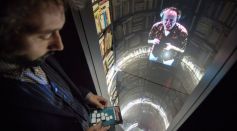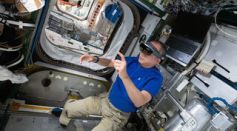Tags: Augmented Reality

Apple Debuts Augmented Reality Headset at WWDC Without Controllers; Vision Pro Can Be Navigated via Eyes, Voice, Hands

New Smart Eyeglasses Lets People See Subtitles in Real-Time, Rewinds Conversations

House Transformation in Just One Click! Tech Experts Develop Artificial Intelligence According to Preferred Style

Big Players Ready to Define and Develop Metaverse Through a Forum

Google Begins Testing New Augmented Reality Glasses a Decade After Its First Product

Augmented Reality Contact Lens Already in Testing Phases and Clinical Trials to Evaluate Functionality

Is Hologram Like Zoom on Steroids? How Does It Work With Augmented Reality?

Virtual ‘Tamagochi’ Children Will Give Parents Real-Life Experience With Kids in the Metaverse By 2070

Digital Reality Meets Pediatric Operations: How Smileyscope Works for Children Afraid of Needles

Metaverse Explained: Its Benefits and How It Can Surpass the Internet

Microsoft's PeopleLens Use AI to Help Blind Kids Improve Social Interaction

Facebook Will Get a New Name Soon; Mark Zuckerberg's Rebranding Scheme Focused on the Metaverse
Arachnophobia Cure: Augmented Reality Platform Act As Exposure Therapy to Help People Overcome Fear of Spiders
Augmented Reality Help Astronauts Fix, Maintain Equipment in the International Space Station Without Assistance From Ground Crew

NASA Astronauts Seek Augmented Reality Assistance to Repair ISS; How Does It Work?

AR/VR Glasses of the Future Need Not Be Bulky, Bug-Eyed with New Technology

Amazon To Open High-Tech Hair Salon In London, Features Augmented Reality App

UNMC Unveils The Teaching Hospital of the Future
Google Creates Ghosts Via Augmented Reality for Halloween

Microsoft's HoloLens 2 Is Helping Engineers Build the Orion Spacecraft
Most Popular

Largest Known Volcanic Aquifer Discovered Beneath Oregon's Cascades

New 'Supergiant' Sea Bug Found in South China Sea, Named After Darth Vader

Mediterranean Sea Was Refilled by a Catastrophic Flood Millions of Years Ago

Mysterious Cosmic Waves That Sound Like Birds Detected in Unexpected Space Region





